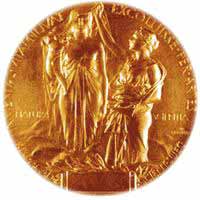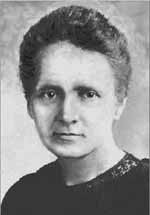Nobel Prize: Difference between revisions
No edit summary |
No edit summary |
||
| (8 intermediate revisions by 3 users not shown) | |||
| Line 1: | Line 1: | ||
== Nobel Prize | == Nobel Prize == | ||
[[Image:Nobelmedal.jpg|thumb|right|The Nobel Medal for Physics. Courtesy: The Nobel Foundation.]] | |||
[[Image: | [[Image:Marie Curie.jpg|thumb|right|Marie Curie, one of only two women awarded the Nobel Prize in Physics and one of only a handful of people to receive the price twice.]]Over the past several decades, the Nobel Prize has been awarded in Physics for some of the most important advancements in the field. Recipients represent a wide array of research interests and the list of names reads like a roll call for the greatest achievements of the last century.Furthermore, many [[AIEE, IRE, and IEEE members who won Nobel Prizes|members of the AIEE, IRE and IEEE have won the award.]] | ||
Alfred Nobel, the Swedish chemist who invented dynamite, was concerned with the ways in which science could impact humanity. Nobel strongly believed in the betterment of mankind and thought those whose life work exemplified his vision should be honored. When he died in 1893, Nobel left nine million dollars in his will to honor the people “whose work conferred the greatest benefit on mankind.” This honor is known as the Nobel Prize. | |||
Since 1901 Nobel Prize laureates have been selected every year for contributions in the areas of peace, literature, physics, chemistry and physiology or medicine. Economic science was added as a sixth category in 1968. Laureates come from all different backgrounds and from countries around the world. Every year, the Swedish Academy requests nominations of candidates in each of the six areas. Once the winners have been chosen, the science and literature laureates are honored at a ceremony that takes place in Sweden. At the ceremony, the King of Sweden presents each laureate with a diploma, a medal, and a cash prize. Peace laureates receive their awards in Oslo, Norway in the presence of the King of Norway. | |||
In the century since the first Nobel Prize was granted, hundreds of laureates have been named. Recipients hail from all different racial and ethnic backgrounds. The United States has had the most Nobel Prize winners, although many of them were immigrants to, not natives of, the U.S. Also heavily represented are the United Kingdom, Germany, and France. The youngest person to receive a Nobel Prize was Physics winner William Lawrence Bragg who was awarded the prize at age 25. The oldest recipient was Joseph Rotblat who won the Peace Prize at age 87. The first woman to receive a Nobel Prize was [[Marie Curie|Marie Curie]] who shared the 1903 Physics award with her husband for their work in spontaneous radiation. Curie was awarded a second prize, this time in Chemistry, in 1911. Only one other woman has been awarded the Physics Prize since Curie. Of the more than 700 recipients of a Nobel, only 30 have been female. | |||
The first Physics recipient was [[Wilhelm Roentgen|Wilhelm Röntgen]] who received the prize for his work with x-rays. Several years later, in 1908,[[Guglielmo Marconi|Guglielmo Marconi]] and Karl Ferdinand Braun were awarded the prize for their work in radio. [[Enrico Fermi|Enrico Fermi]] won the 1938 Physics Prize for his work on the precursor to nuclear fission. The 1956 Physics Prize was awarded to [[William Shockley|William Shockley]], [[John Bardeen|John Bardeen,]] and [[Walter H. Brattain|Walter Brittain]] for their invention of the transistor. Just a few years later, [[Charles Townes|Charles Townes]] worked out the principles used to create the laser; he was awarded the Physics Prize in 1964. One of Townes’ students at Columbia University was a young man named [[Arno Allan Penzias|Arno Penzias]]. Penzias and colleague Robert Wilson discovered [[Cosmic Background Radiation|cosmic background radiation]], that is, noise left over from the Big Bang. The pair was awarded the 1978 Physics Prize for this discovery. | |||
Today the Nobel Prize is still awarded to men and women who represent the very best in their field. Few awards even begin to rival it in prestige. To the 700 or so people who have received it, the Nobel Prize is surely one of the greatest honors they have been granted. | |||
[[Category:Awards_&_fellow_activities]] | |||
[[Category:Non-profit]] | |||
[[Category: | |||
Revision as of 17:16, 10 February 2012
Nobel Prize
Over the past several decades, the Nobel Prize has been awarded in Physics for some of the most important advancements in the field. Recipients represent a wide array of research interests and the list of names reads like a roll call for the greatest achievements of the last century.Furthermore, many members of the AIEE, IRE and IEEE have won the award.
Alfred Nobel, the Swedish chemist who invented dynamite, was concerned with the ways in which science could impact humanity. Nobel strongly believed in the betterment of mankind and thought those whose life work exemplified his vision should be honored. When he died in 1893, Nobel left nine million dollars in his will to honor the people “whose work conferred the greatest benefit on mankind.” This honor is known as the Nobel Prize.
Since 1901 Nobel Prize laureates have been selected every year for contributions in the areas of peace, literature, physics, chemistry and physiology or medicine. Economic science was added as a sixth category in 1968. Laureates come from all different backgrounds and from countries around the world. Every year, the Swedish Academy requests nominations of candidates in each of the six areas. Once the winners have been chosen, the science and literature laureates are honored at a ceremony that takes place in Sweden. At the ceremony, the King of Sweden presents each laureate with a diploma, a medal, and a cash prize. Peace laureates receive their awards in Oslo, Norway in the presence of the King of Norway.
In the century since the first Nobel Prize was granted, hundreds of laureates have been named. Recipients hail from all different racial and ethnic backgrounds. The United States has had the most Nobel Prize winners, although many of them were immigrants to, not natives of, the U.S. Also heavily represented are the United Kingdom, Germany, and France. The youngest person to receive a Nobel Prize was Physics winner William Lawrence Bragg who was awarded the prize at age 25. The oldest recipient was Joseph Rotblat who won the Peace Prize at age 87. The first woman to receive a Nobel Prize was Marie Curie who shared the 1903 Physics award with her husband for their work in spontaneous radiation. Curie was awarded a second prize, this time in Chemistry, in 1911. Only one other woman has been awarded the Physics Prize since Curie. Of the more than 700 recipients of a Nobel, only 30 have been female.
The first Physics recipient was Wilhelm Röntgen who received the prize for his work with x-rays. Several years later, in 1908,Guglielmo Marconi and Karl Ferdinand Braun were awarded the prize for their work in radio. Enrico Fermi won the 1938 Physics Prize for his work on the precursor to nuclear fission. The 1956 Physics Prize was awarded to William Shockley, John Bardeen, and Walter Brittain for their invention of the transistor. Just a few years later, Charles Townes worked out the principles used to create the laser; he was awarded the Physics Prize in 1964. One of Townes’ students at Columbia University was a young man named Arno Penzias. Penzias and colleague Robert Wilson discovered cosmic background radiation, that is, noise left over from the Big Bang. The pair was awarded the 1978 Physics Prize for this discovery.
Today the Nobel Prize is still awarded to men and women who represent the very best in their field. Few awards even begin to rival it in prestige. To the 700 or so people who have received it, the Nobel Prize is surely one of the greatest honors they have been granted.

